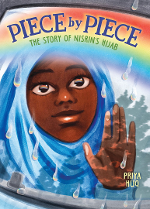Publishers' Preview: Debut Authors and Illustrators: Five Questions for Priya Huq
In Priya Huq’s graphic novel Piece by Piece: The Story of Nisrin’s Hijab, Bangladeshi American Nisrin decides — to her mother’s distinct discomfort — to try wearing hijab.

This interview originally appeared in the July/August 2021 Horn Book Magazine as part of the Publishers’ Previews: Debut Authors and Illustrators, an advertising supplement that allows participating publishers a chance to each highlight a book from its current list. They choose the books; we ask the questions.
Sponsored by

In Priya Huq’s graphic novel Piece by Piece: The Story of Nisrin’s Hijab, Bangladeshi American Nisrin decides — to her mother’s distinct discomfort — to try wearing hijab.
 1. What quality does Nisrin have that you wish for yourself?
1. What quality does Nisrin have that you wish for yourself?
Nisrin and I are really similar in core personality. We’re both playful and joyful by nature, and we can both be self-centered. I wrote her to be me if I had felt supported by my family after September 11th, so it’s less an intrinsic quality of hers I wish I had, and more that I wish my nani (maternal grandmother), my mom, and I had the relationship Nisrin has with her family members. I was much closer to my nana (maternal grandfather) growing up.
2. Did young you wear an orna or any other type of headscarf?
Yes! When I was little, I loved wearing an orna as a headscarf. When I got older, I always chose the shalwar kameez. I love the different cuts, patterns, materials, and embroidery.
3. What’s your wardrobe like these days?
 Right now I’m wearing a black velvet A-line midi skirt, a Star Wars T-shirt that my cats tore a bunch of holes in, and fuzzy slippers. I wear leggings or jeans and T-shirts, but working on Piece by Piece made me want to be brave like Nisrin, so I bought a new shalwar and wore it out the other day.
Right now I’m wearing a black velvet A-line midi skirt, a Star Wars T-shirt that my cats tore a bunch of holes in, and fuzzy slippers. I wear leggings or jeans and T-shirts, but working on Piece by Piece made me want to be brave like Nisrin, so I bought a new shalwar and wore it out the other day.
4. Have you been to Bangladesh?
Only once, years ago. It makes me sad to think about all my relatives who I don’t see.
5. What did you get to do in Piece by Piece that you didn’t get to do in a comic before?
I’ve alluded to the 1971 genocide in Bangladesh in other work, but I’ve never talked about it so directly. Writing a family that was similar enough to mine to talk about these feelings and histories, but not so similar that I drowned in grief, meant that I was able to be more emotionally honest. It was hard, but it made me love Nisrin and her family. I hope I did a good job!
Sponsored by

RELATED
ALREADY A SUBSCRIBER? LOG IN
We are currently offering this content for free. Sign up now to activate your personal profile, where you can save articles for future viewing.







Add Comment :-
Be the first reader to comment.
Comment Policy:
Comment should not be empty !!!